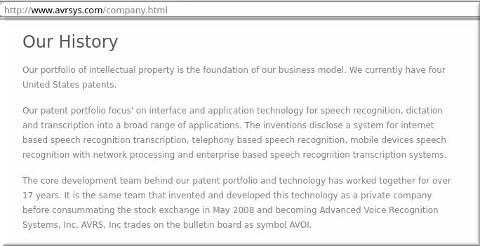

So the whole 'company' is just a pile of patents (since its inception)
35 U.S.C. ۤ 101 isn't too complicated. Based on (or partly inspired by) several SCOTUS decisions, Section 101 limits patent scope and notably eliminates patents on abstract things (or ideas, including algorithms). The USPTO's current guidelines ought to assure that no software patents will be granted anymore; nevertheless, there are conflicting interests. That's why inter partes reviews (IPRs) and court challenges are needed. But, as one might expect, the patent maximalists aren't happy; they see this as an "attack" (a word they use) on their occupation or an attempt to "kill" (also a word they sparingly use) patents. They nowadays sling their guns and shoot from the hip at IPRs, at judges, and at courts. Some if not many are based in Texas, so the gun-slinging metaphor seems apt; not to mention their obsession with words like "attacks" and "kills". They call some tribunals "death squads", evoking a colourful metaphor of genocide.
"They don't profit from innovation; they make a living from extortion and lawsuits."Anything that these patent maximalists (some we call "extremists" because they go even further) throw at 35 U.S.C. ۤ 101 is easy to debunk; they just cannot tolerate patent quality, patent justice and so on. They want a culture of protection rackets, not of innovation. They don't profit from innovation; they make a living from extortion and lawsuits. Their trade involves writing threatening letters, demanding money.
35 U.S.C. ۤ 101 hasn't been in the headlines lately, partly because of the summer vacation. Some pundits wrote about Mayo, which also helped shape 35 U.S.C. ۤ 101. We wrote about Vanda 3 weeks ago in "The Dangerous Adoption of Patents on Life and Nature" and 3 months ago in "The Federal Circuit's (CAFC) Decisions Are Being Twisted by Patent Propaganda Sites". The case is about Mayo, not about Alice, and it isn't as "high level" as either of them. In a sense, it's hardly even a big deal at all. This is very old news, too. Why is Donald Zuhn catching up with it weeks if not months late? Is this the best method for pushing their anti-35 U.S.C. ۤ 101 agenda yet again (as news is slow)?
Earlier this week Zuhn (McDonnell Boehnen Hulbert & Berghoff LLP) wrote:
The memorandum explains that in Vanda, the Federal Circuit determined that the claims at issue are "patent eligible under 35 U.S.C. ۤ 101 because they are not 'directed to' a judicial exception" (emphasis in memorandum).
Advanced Voice Recognition Systems, Inc. ("AVRS") (OTC: AVOI) announced today that it has filed a lawsuit in the United States District Court-Northern District for Arizona against Apple, Inc. ("Apple") for infringement of U.S. Patent No. 7,558,730 entitled "Speech Recognition and Transcription Among Users Having Heterogeneous Protocols" (the "'730 Patent"). The '730 Patent is the first of AVRS' family of patents in the field of speech recognition and transcription
HEVC (also known as H.265) is a video compression standard originally developed to provide high quality video coding using half the bandwidth.
"Mozilla complained about it yesterday, dubbing it “An Invisible Tax”."The Section 101 conundrum will no doubt continue to occupy the media for a year (if not years) to come. The "thickening" (as in patent thickets) of software standards/APIs, preventing participation by those who lack a large number of patents, is what's at stake. Mozilla complained about it yesterday, dubbing it "An Invisible Tax". ⬆